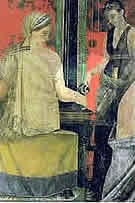| |||||||||||||||||||||||||||||||||
| Facts > Pagan Ideas > Baptism | ||||
| Christianity has baptism—but Paganism had it first |
 Was Christianity new? Was Christianity unique? Let's talk about Pagan baptism. By the time of Jesus purification with water was already an ancient Pagan sacrament. Purification—from unclean foods, or acts, or contacts—is an idea so old it fades into pre-history. Pagans purified themselves with fire, incense, blood sacrifice, they even purified themselves with a winnowing fan or sea onions! But the most used, most widespread tool of pagan purification was...water. 
|

|
||
|
Pagan water purification rituals were used in the archaic Near East and are written about in the Old Testament. Homer mentions the washing of hands before prayer, and the purification of an entire army with water [Iliad, 1.313]. The Greeks even had priests, kathartai, who specialized in purification with water. Mithra's followers celebrated the sacrament of taurobolium—baptism in the blood of a bull, with the result of "Salvation." Pagans at Gerasa celebrated the Maioumas, rites in which women bathed and were purified in a sacred pool outside town. |
|
New members into the Mysteries of Isis / Osiris began their initiation with a sprinkling of purifying waters brought from the Nile. The result of the baptism and initiation? Salvation Read the words of the ancients > |
"a kind of voluntary death and salvation through divine grace." [Apuleius, Metamorphosis, Book 11, 21], and "..we shall have salvation" [Firmicus Maternus, The Error of Pagan Religions, 22.1]. |
|
The ancient Church Father Tertullian,
noting that Pagan baptism preceded the
Christian sacrament, describes purifying water's several Pagan
uses: Read Tertullian's words yourself > |
"[Non-Christians] ascribe to their idols the imbuing of waters with the self-same efficacy [of purification]. ... For washing is the channel through which they are initiated into some sacred rites--of some notorious Isis or Mithras... Moreover, by carrying water around, and sprinkling it, they everywhere expiate country-seats, houses, temples, and whole cities: at all events, at the Apollinarian and Eleusinian games they are baptized; and they presume that the effect of their doing that is their regeneration and the remission of the penalties due to their perjuries. Among the ancients, again, whoever had defiled himself with murder, was wont to go in quest of purifying waters."—I.e. Washing away sin! [Tertullian, On Baptism, Ch 5.] |
|
Church Father Justin Martyr (he lived in the 100s AD) was also worried to explain why the Christian rite was preceded for generations by the Pagan sacrament. The answer, says Justin, was diabolical imitation. Here's how diabolic imitation works. Generations before Jesus, the devils knew not just that Jesus was coming, but also that Christians would have baptism. The devils knew this by reading the Old Testament prophecy. So, anyway, the devils "caused" the Pagans to have baptism too—generations before Jesus. Read Justin's words for yourself > |
And the devils, indeed, having heard this washing published by the prophet, instigated those who enter their temples, and are about to approach them with libations and burnt-offerings, also to sprinkle themselves; and they cause them [the pagans] also to wash themselves entirely, as they depart [from the sacrifice], before they enter into the shrines in which their images are set. [Justin Martyr, First Apology, Ch 62] |
|
Here's how the Catholic Encyclopedia describes initiation into various mystery religions in the centuries before Christ > "Baptism" in quotation marks because the Catholic Encyclopedia denies it was true baptism—of course! |
"These mysteries usually began with the selection of initiandi, their preliminary "baptism", fasting, and (Samothrace) confession." [Paganism, in The Catholic Encyclopedia, Volume XI. |
|
The next time you're in Church Wow! |
|
Believing Scholarship Here's an example, from a famous and widely quoted essay, talking about Pagan water purification sacraments, all of which were around before Christianity. It's a long quote, but it's worth reading > |
"We know of an ablution in the ritual of Eleusis; the laurel-wreath oration of Demosthenes speaks of purificatory ablutions in the mystery of Sabazius; the cult of Attis had its taurobolium, and the mystery of Isis knew a sanctifying baptismal bath, as did the mysteries of Dionysus and of Mithras. Upon mature consideration modern scholarship has rejected the ideas that such rites exerted an influence on the baptismal doctrine of the New Testament,"[Hugo Rahner, The Christian Mystery and the Pagan Mysteries, section 3, in The Mysteries; Papers from the Eranos Yearbooks, edited by Joseph Campbell] |
|
In other words, back when Christianity started, where it started, among the people who were its earliest converts, you couldn't walk down the street without tripping over a Pagan baptism; but our Christian baptism, that's completely different and unrelated to all the other baptisms. This is the kind of stuff believing academics write down and pass around. You need to understand that as you sift through the scholarship. |
|
A scholarly and handsome
reader Kicks POCM's Ass
|
|||||||||
| |||||||||
 When they get to the part about the sacrament of baptism,
When they get to the part about the sacrament of baptism, 
 Based
on the New Testament
Based
on the New Testament